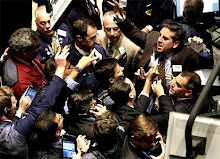Wednesday, November 16, 2011
Oanda to clients
Oanda, one of the largest online currency trading platforms for retail investors, has some unusual advice for its customers: Stay out of the market.
“We are encouraging our clients not to trade right now, but to watch the market carefully,” said Michael Stumm, president and chief executive at Oanda, in an interview.
Oanda this week sent an email to its clients, advocating that they move to the sidelines and watch the markets tussle over each new headline out of Europe.
Oanda had over 29,000 U.S. clients at the end of the first quarter, the most of any retail broker, according to the most recent data available from research firm Aite Group.
The brokerage stands to lose revenue if customers heed its warning and trading volume falls. Online trading platforms like Oanda earn money on the spreads between the offering and asking prices in each transaction.
But if Oanda clients stay in the market and lose big, they’ll walk away for good, Stumm said.
“We want them to be with us for the long term,” he said.
Currencies have swung wildly and unpredictably over the last few weeks as European leaders have struggled to agree on a comprehensive fix for the continent’s debt crisis. On Wednesday, the euro traded at $1.3495, up from a one-month low of $1.3429 hit earlier in the day.
“Our analogy is that if there is a storm brewing, you don’t go out in a sailboat if you are an amateur sailor,” Stumm said. “If you are a real professional and have weathered multiple storms, then it might be a lot of fun, and you might get a lot out of it. … And I think the same holds true for the forex markets.”
It’s too soon to say whether clients are heeding Oanda’s advice, said Dean Popplewell, the company’s chief currency strategist.
Currency traders say they are fielding more calls from clients of all types looking for additional guidance on hedging and investment strategies.
“Companies are taking a much closer look at all of their risks,” said Jack Spitz, managing director of foreign exchange, financial markets and derivatives at National Bank in Toronto. “They are spending much more time doing due diligence about tail risks and currency volatility.”
That volatility, Stumm said, is “generally not good” for retail clients.
During the financial crisis in 2008, Oanda saw a substantial drop in trading activity as clients, disappointed by losses or overcome by fear, withdrew from the market.
Oanda is seeing parallels to 2008. Volatility also surged just before the 2008 recession, cautioned Oanda analysts.
This week, seeing no end to the European debt crisis, and the currency market tumult it was causing, Oanda hit “send” on its cautionary email.
Subscribe to:
Comments (Atom)


